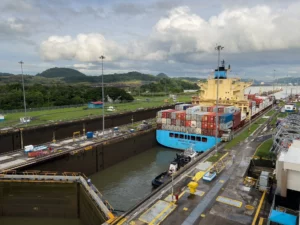Maersk, a major logistics and shipping company, has announced a change in its route due to low water levels in the Panama Canal, one of the world’s key maritime trade routes.
The Danish company reported that the reduced water levels have led to fewer ships passing through the canal.
Consequently, Maersk is opting to reroute its ships, avoiding the canal affected by the drought.
The Panama Canal Authority has limited the number and weight of ships based on current and projected water levels in Gatun Lake.
This lake, fed primarily by rain, powers the ships through the canal’s lock system.

In response to this challenge, Maersk is now utilizing a “land bridge.”
This alternative involves transporting cargo by rail along the 80-kilometer stretch of the Panama Canal to the other side, as stated in a communication to its customers.
The ongoing drought in Panama has reduced the availability of transit slots in the canal.
As a result, tanker and grain shipping companies are already taking longer routes to bypass congestion. This shift is causing further disruptions in the global shipping network.
Companies like Maersk and Hapag Lloyd are leaving the Red Sea route as well, following intensified attacks on ships in the Gulf region by Iran-backed Houthi militias in Yemen.
Background
The Panama Canal’s reduced capacity due to drought reflects the global shipping industry’s vulnerability to environmental changes.
Maersk’s rerouting via a “land bridge” exemplifies the need for adaptable trade strategies.
Similar disruptions, like the 2021 Suez Canal blockage, highlight the risks of relying on key maritime paths.
This shift impacts not only Latin America but also global trade, potentially altering international trade routes and costs.
The situation also intertwines with geopolitical factors, as seen with Maersk avoiding the Red Sea due to security concerns.
These changes could lead to a reevaluation of global shipping practices, focusing on flexibility and resilience.
Maersk’s approach might set an industry benchmark, emphasizing the importance of adaptability in logistics.

